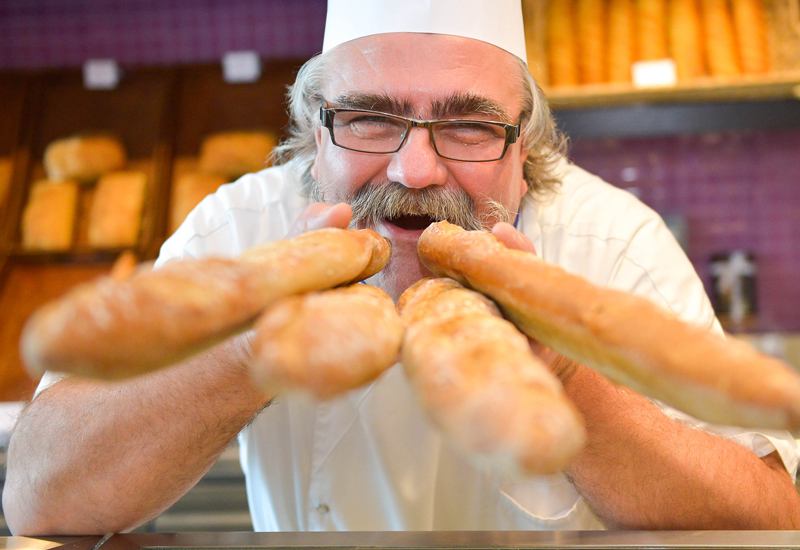Baked goods have been around for thousands of years, though every year brings along its own set of opportunities and challenges. Flavours transition, demands alter and techniques improve — we ask the experts in the region what they think is trending, challenging, and facilitating their endeavours
There has been an increase in bakeries around the region — do you agree?
There has been an eminent rise, interviewees concur, although the reasons differ. Al Bayader International corporate marketing manager Ali Taha says the reason is the diversity in the region and rapid economic growth. “The Gulf region, particularly the UAE, is known for its diverse population and rapid economic growth and development. Hence, it is understandable why the number of restaurants, cafés and bakeries have amplified. The demand for convenience is one of the main reasons that supports the busy and fast way of living in the region. Breakfast is not had at home anymore, and people would stop by bakeries and cafés, and eat in the car during a traffic jam. This has become an acceptable lifestyle now.”

| Advertisement |
Love Doughnuts partner and head chef Ibrahim Baig adds: “With bread being the staple diet of most cultures, and the UAE being a melting pot of nationalities, it comes as little surprise then, that both international as well as home-grown brands are vying for a slice of the bread market. The beauty of bread lies in its versatility — we do doughnuts, another brand does buns, and a third does brioches... there’s enough for everyone’s need.”
Demographics also plays a pertinent role, suggests Aramtec sales & marketing manager — pastry division Riyadh Hassan. “There is a growth due to the population increase, especially the young population, which is almost 30% and aged between 0-14, who are the best customers for cakes, cupcakes and cookies. Moreover, 66% of the population are aged between 15-64, with most under the age of 40, who are the best customers for prepared desserts.”
Rue Flambée export manager Silvia Persico says she has seen an increase, but an internal expansion of venues instead of retail outlets. Similarly, Baqer Mohebi Enterprises marketing manager Mazen Marakebji says “the wholesale baking industry has grown significantly, more than the artisan around the region”.
Is health a concern in the market, and how can bakers adapt working methods to this niche?
The problem is very real, and has hit home, as Taha elaborates. “Health has become the main issue in the region, especially in the UAE. People are faced with issues such as diabetes and obesity, due to consumption of processed foods. Kids at a young age suffer from being overweight.
“Awareness is one of the key solution, which the Dubai Health Authority (DHA) is continuously working on. Being healthy does not mean that bakers have to compromise on the taste, as the customer will not be pleased. The idea is to use more organic and less artificial ingredients. For instance, brown rice flour, buckwheat flour and quinoa flour are all gluten-free substitutes for whole wheat flour, which is high in calorie content. The use of almond flour, hazelnut flour, chestnut and peanut flours are high protein non-grain options, and is also recommended.”
Another alternative is working with fruits and producing baked goods from scratch. Magnolia Bakery chief baking officer Bobbie Lloyd says: “It’s important to focus on baking with natural, fresh and seasonal ingredients, particularly when using fruits or vegetables in recipes. When you offer something baked from scratch you know what’s in the recipe; there are no preservatives or added sugars. We bake in small batches on the premises throughout the day, using fresh ingredients without preservatives or additives.”
Glee Hospitality Solutions MD Abdul Kader Saadi holds bakers and chefs responsible for being creative and finding the right balance between taste and nutrients. “It is imperative that each baker is well aware of health trends and healthy ingredients. This knowledge is useful to create a variety of healthy breads and fulfil the needs of health-conscious customers. A good baker will always research, read, and tap various innovative ideas.”
Hassan adds a few examples of creativity in a commercial kitchen: “Wholesale baking industry can fortify its mass-produced, foil-wrapped baked goods to pack nutrients, so it is not considered junk food. For example, buns for hamburgers and hot dogs can be made with whole white wheat or whole grain instead of refined grains, as the former contains a chockfull of important nutrients. In addition, chefs can add fruity chutneys to savoury dishes instead of fatty sauces, or cooking fruit-rich desserts in place of ingredients like chocolate, cream and custard.”
What are the optimum ways of storing baking ingredients to maintain quality and ensure hygiene standards are met?
Investing in durable and hygienic utensils and equipment can be the first step to prevent floor, hand or air contamination and increase product life.
Marakebji lists down a few basics; “Properly store yeast, improvers and mixes in a dry place, at no higher than 25°C. Close the packages tightly after each use, and clean the preparation area promptly after use. Room temperature must be maintained between 20-25°C, with 55-80% relative humidity.”
Horeca category executive — pastry Luciana Franchi adds that frozen products need to be stored at -18°C degrees, whereas chilled items like butter, cream, custard and eggs are kept at 3°C, says Lloyd.
Taha concludes: “Keep track of the expiration date. Labelling each ingredient in a larger print will make it easier to differentiate the old from new inventory.”
Do you think the future of bakeries lies in standalone establishments or as a part of an outlet (like retail stores, supermarkets, etc)?
Our experts believe that there is a divide, based on consumers’ habits and preferences. Baig says: “To me, the word ‘bakery’ instantly awakens the senses to the smell of early morning baking, a family-run business, and a walk down a cobble-stoned street. Naturally then, I am the standalone bakery type customer. Likewise, for customers who have cost or convenience as the priority, supermarkets are the way to go. It really boils down to consumer habits and the future lies with he who caters for his audience.”
Lloyd adds that while there are many options, from sit down cafés to quick service and grab & go, she prefers outlets that bake on site, regardless of the venue. “There is a proliferation of stores that call themselves bakeries yet there is not an oven on site. This means they are baking in a production facility and delivering the finished product. This is not a bakery to me. I want to walk in and smell butter and chocolate.”
Yoshio Nishiyama, who is the chef at Mikado Café, firmly believes that standalone is the way to go. “The future of bakeries definitely lies in standalone establishments as they can provide more refined quality of bread, at the same time maintaining local touch. Supermarkets mostly have run-of-the-mill breads which would always be popular with supermarket goers.
“But nowadays since the number of bread connoisseurs are increasing, more and more people are becoming aware of good breads and bakeries... hence I believe the future lies in standalone establishments. Supermarket breads are generally produced in bulk due to which the quality may be compromised, whereas Japanese bread requires artisan skills and are baked with utmost precision.”
How do you view the range of training options available for aspiring bakers — are there enough opportunities for them?
Nishiyama says: “Worldwide, yes there are a lot of opportunities available for upcoming bakers. There are also many good universities that give aspiring bakers an array of opportunities to join baking courses that would help enhance their baking skills. On the other hand, there is always the internet which can be referred to, and one can learn by watching various videos on baking and self-educate themselves by practically trying out baking techniques at home.”
Lloyd shares similar views, advocating the many resources for a baker who is passionate and committed to explore. She adds that on-job training is another route that many can take with considerable ease. “We’ve had a number of employees who have started with us as porters and worked their way up to being bakers through hard work and training. Most importantly you have to have a passion for baking.”
Baig, however, begs to differ. “Training for bakers is one area where the UAE has still to catch up with its international counterparts. Most training schools focus on cuisine or patisserie, inspired by trends from TV shows like Hell’s Kitchen, Top Chef etc where baking is relegated to the corner. No one to blame though; for a dessert, the bread scene in the UAE has surpassed every expectation. So, yes, there are opportunities — more for trainers to begin training than for bakers looking to be trained. Hopefully, the surge of bakeries, brands and bread will reverse that.”










 Search our database of more than 2,700 industry companies
Search our database of more than 2,700 industry companies









